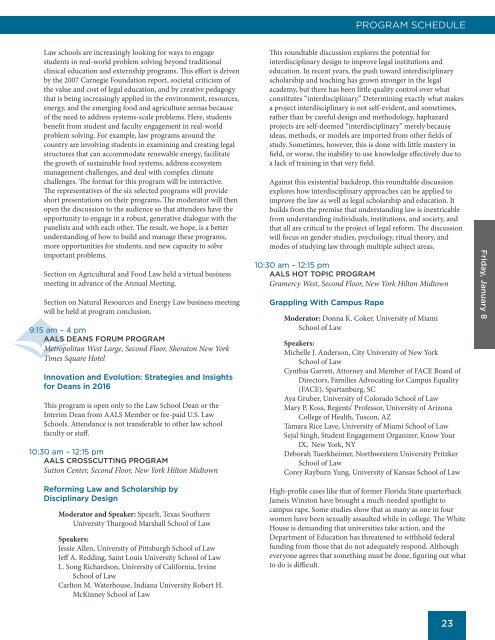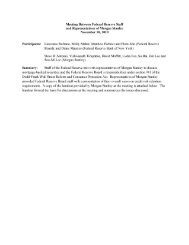You also want an ePaper? Increase the reach of your titles
YUMPU automatically turns print PDFs into web optimized ePapers that Google loves.
PROGRAM SCHEDULE<br />
Law schools are increasingly looking for ways to engage<br />
students in real-world problem solving beyond traditional<br />
clinical education and externship programs. This effort is driven<br />
by the 2007 Carnegie Foundation report, societal criticism of<br />
the value and cost of legal education, and by creative pedagogy<br />
that is being increasingly applied in the environment, resources,<br />
energy, and the emerging food and agriculture arenas because<br />
of the need to address systems-scale problems. Here, students<br />
benefit from student and faculty engagement in real-world<br />
problem solving. For example, law programs around the<br />
country are involving students in examining and creating legal<br />
structures that can accommodate renewable energy, facilitate<br />
the growth of sustainable food systems, address ecosystem<br />
management challenges, and deal with complex climate<br />
challenges. The format for this program will be interactive.<br />
The representatives of the six selected programs will provide<br />
short presentations on their programs. The moderator will then<br />
open the discussion to the audience so that attendees have the<br />
opportunity to engage in a robust, generative dialogue with the<br />
panelists and with each other. The result, we hope, is a better<br />
understanding of how to build and manage these programs,<br />
more opportunities for students, and new capacity to solve<br />
important problems.<br />
Section on Agricultural and Food Law held a virtual business<br />
meeting in advance of the Annual Meeting.<br />
Section on Natural Resources and Energy Law business meeting<br />
will be held at program conclusion.<br />
9:15 am – 4 pm<br />
AALS DEANS FORUM PROGRAM<br />
Metropolitan West Large, Second Floor, Sheraton New York<br />
Times Square Hotel<br />
Innovation and Evolution: Strategies and Insights<br />
for Deans in 2016<br />
This program is open only to the Law School Dean or the<br />
Interim Dean from AALS Member or fee-paid U.S. Law<br />
Schools. Attendance is not transferable to other law school<br />
faculty or staff.<br />
10:30 am – 12:15 pm<br />
AALS CROSSCUTTING PROGRAM<br />
Sutton Center, Second Floor, New York Hilton Midtown<br />
This roundtable discussion explores the potential for<br />
interdisciplinary design to improve legal institutions and<br />
education. In recent years, the push toward interdisciplinary<br />
scholarship and teaching has grown stronger in the legal<br />
academy, but there has been little quality control over what<br />
constitutes “interdisciplinary.” Determining exactly what makes<br />
a project interdisciplinary is not self-evident, and sometimes,<br />
rather than by careful design and methodology, haphazard<br />
projects are self-deemed “interdisciplinary” merely because<br />
ideas, methods, or models are imported from other fields of<br />
study. Sometimes, however, this is done with little mastery in<br />
field, or worse, the inability to use knowledge effectively due to<br />
a lack of training in that very field.<br />
Against this existential backdrop, this roundtable discussion<br />
explores how interdisciplinary approaches can be applied to<br />
improve the law as well as legal scholarship and education. It<br />
builds from the premise that understanding law is inextricable<br />
from understanding individuals, institutions, and society, and<br />
that all are critical to the project of legal reform. The discussion<br />
will focus on gender studies, psychology, ritual theory, and<br />
modes of studying law through multiple subject areas.<br />
10:30 am – 12:15 pm<br />
AALS HOT TOPIC PROGRAM<br />
Gramercy West, Second Floor, New York Hilton Midtown<br />
Grappling With Campus Rape<br />
Moderator: Donna K. Coker, University of Miami<br />
School of Law<br />
Speakers:<br />
Michelle J. Anderson, City University of New York<br />
School of Law<br />
Cynthia Garrett, Attorney and Member of FACE Board of<br />
Directors, Families Advocating for Campus Equality<br />
(FACE), Spartanburg, SC<br />
Aya Gruber, University of Colorado School of Law<br />
Mary P. Koss, Regents’ Professor, University of Arizona<br />
College of Health, Tuscon, AZ<br />
Tamara Rice Lave, University of Miami School of Law<br />
Sejal Singh, Student Engagement Organizer, Know Your<br />
IX, New York, NY<br />
Deborah Tuerkheimer, Northwestern University Pritzker<br />
School of Law<br />
Corey Rayburn Yung, University of Kansas School of Law<br />
Friday, January 8<br />
Reforming Law and Scholarship by<br />
Disciplinary Design<br />
Moderator and Speaker: SpearIt, Texas Southern<br />
University Thurgood Marshall School of Law<br />
Speakers:<br />
Jessie Allen, University of Pittsburgh School of Law<br />
Jeff A. Redding, Saint Louis University School of Law<br />
L. Song Richardson, University of California, Irvine<br />
School of Law<br />
Carlton M. Waterhouse, Indiana University Robert H.<br />
McKinney School of Law<br />
High-profile cases like that of former Florida State quarterback<br />
Jameis Winston have brought a much-needed spotlight to<br />
campus rape. Some studies show that as many as one in four<br />
women have been sexually assaulted while in college. The White<br />
House is demanding that universities take action, and the<br />
Department of Education has threatened to withhold federal<br />
funding from those that do not adequately respond. Although<br />
everyone agrees that something must be done, figuring out what<br />
to do is difficult.<br />
23



